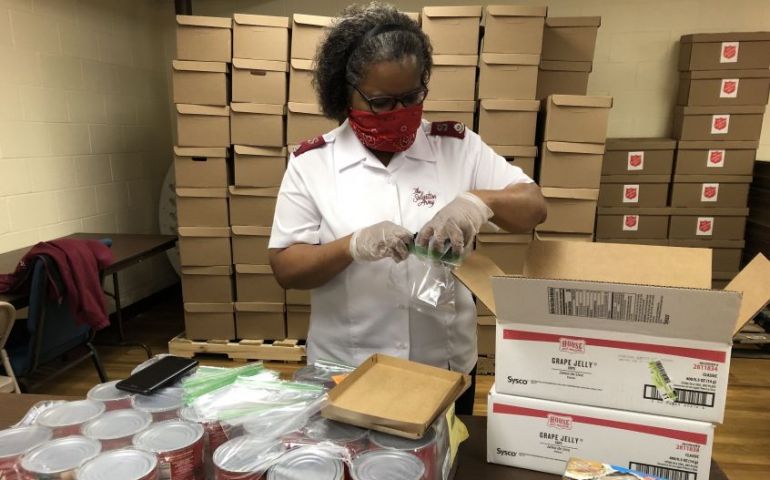Salvation Army Responds to COVID-19 Related Food Insecurity
Laura Krueger | laura.krueger@use.salvationarmy.org

Hartford, CT - As food insecurity increases, The Salvation Army’s Emergency Disaster Services department has organized food distribution hubs throughout the state of Connecticut to enhance the flow of much-needed resources to residents in need.
The Salvation Army’s Hub in Bridgeport, CT serves as a food box distribution point for Salvation Army corps in Bridgeport, Norwalk, and Stamford as well as Salvation Army Service Unit locations in Greenwich and Ridgefield. Food boxes are packed from deliveries of donated items as well as food purchased through donations. These disaster food boxes contain shelf-stable food like pasta, canned vegetables, and cereal that can be used to make 30-35 meals for a household. Price Rite is a year-round donor and recently supplied 450 packs of Hi-C juice boxes and 400 boxes of Oreo cereal.
The need for food has been gradually increasing as more jobs are lost due to the impact of the COVID-19 crisis. “As word gets out that we’re here and giving out food, our phones are ringing all the time,” said Major Lydia Pearson, corps officer at The Salvation Army in Bridgeport, where the need has tripled over the last few weeks. “We do about 35 appointments a day about 15 minutes apart. Plus, we make deliveries to seniors or people who can’t get out.”
In particular, homebound seniors are a demographic that are suffering through the stay-at-home order. “Many seniors are afraid and think they’re not going to have food,” Major Pearson said. “On Good Friday, I delivered a food box to a veteran, who hadn’t eaten in three days.” This veteran, along with other seniors have been added to a regular route and are being checked on to be sure they are managing through the crisis. Some seniors are without family support.
Unexpected donations have greatly helped the effort. “I’m very grateful and surprised for anything people can do to help us,” said Major Pearson. “I’m also grateful for our employees.” The small number of employees at The Salvation Army corps have adjusted their typical duties to help with the COVID response by placing food bank orders, helping to pack boxes and assisting with food distribution.
The Salvation Army’s Emergency Disaster Services (EDS) department is coordinating with state and local leads to determine gap feeding needs for vulnerable populations across the state. With the growing need, EDS is continually working to secure the food from multiple sources and assemble and then distribute hundreds of these food boxes to hard hit areas each week.
About The Salvation ArmyThe Salvation Army annually helps more than 30 million Americans overcome poverty, addiction, and economic hardships through a range of social services. By providing food for the hungry, emergency relief for disaster survivors, rehabilitation for those suffering from drug and alcohol abuse, and clothing and shelter for people in need, The Salvation Army is doing the most good at 7,600 centers of operation around the country. In the first-ever listing of “America’s Favorite Charities” by The Chronicle of Philanthropy, The Salvation Army ranked as the country’s largest privately funded, direct-service nonprofit. For more information, visit www.SalvationArmyUSA.org. Follow us on Twitter @SalvationArmyUS and #DoingTheMostGood.